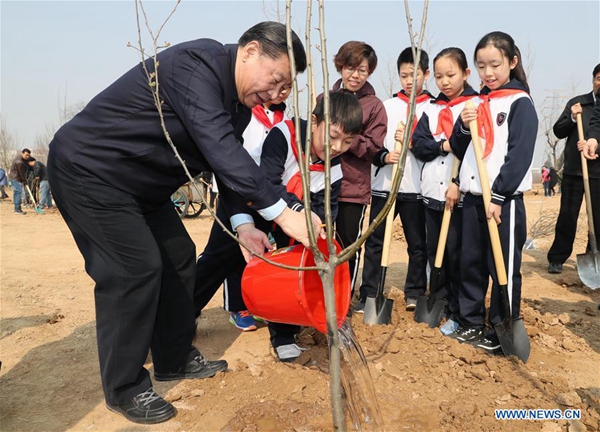Xi attends tree planting activity, calls for protecting nature
|
Chinese President Xi Jinping (L) waters a sapling as he attends a tree planting activity in Beijing, capital of China, March 29, 2017. [Photo/Xinhua] |
Chinese President Xi Jinping on Wednesday stressed the importance of afforestation and urged people, especially the young, to understand and protect nature via tree planting activities.
Xi, also general secretary of the Communist Party of China (CPC) Central Committee, made the remarks while visiting east Beijing’s Chaoyang District and planting saplings of different types of trees.
Other top leaders, including Zhang Dejiang, Yu Zhengsheng, Liu Yunshan, Wang Qishan and Zhang Gaoli, also attended the activity.
Xi called for cultivating awareness about loving nature and treasuring lives, and learning about green development.
“Planting trees now will benefit our future generations, and we should roll up our sleeves to plant more trees year after year, generation after generation,” Xi said.
Xi planted trees on an area covering more than 13 hectares in Beijing’s first greenbelt region. The area used to be a village. In October 2015, villagers were relocated and the land was left for afforestation.
Xi said China has a tradition of planting trees around Qingming Festival, which falls on April 4 this year.
The festival is one of the 24 seasonal division points in China, usually falling on April 4-6 each year. After the festival, the temperature rises and rainfall increases. It is the high time for spring plowing and sowing.
Volunteer tree planting by all citizens is important for raising ecological awareness and creating consensus and synergy in promoting ecological protection, Xi said.
Xi urged school children around the nation to foster awareness about environmental protection starting in childhood, encouraging them to plant trees with their hands for the motherland and a beautiful world.
While acknowledging progress in the afforestation drive over recent years, Xi said the country is still not green enough.
“We should keep on working,” he said.
Xi urged Party committees and governments at all levels to coordinate management of mountains, waters, forests and farmland, speed up integrating the afforestation of urban and rural areas, increase afforested areas, and improve the quality of forests.
Xi stressed that it is every citizen’s statutory duty to participate in tree planting, and leaders at all levels should set an example in this regard.

![Bike-sharing reinvigorates manufacturers [Xinhua] Bike-sharing reinvigorates manufacturers [Xinhua]](http://images.china.cn/attachement/jpg/site1007/20170329/b8aeed9906a71a4568a80e.jpg)